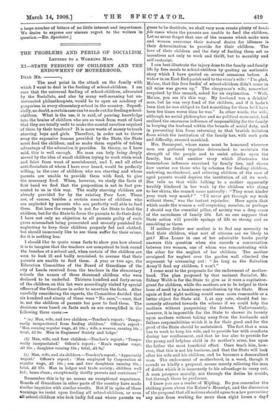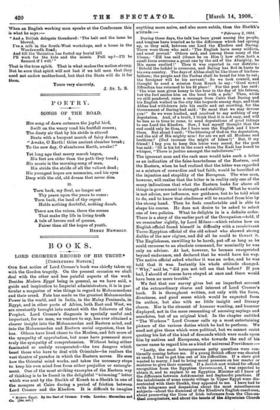THE PROBLEMS AND PERILS OF SOCIALISM. LETTERS TO A WORKING
MAN.
XI.-STATE FEEDING OF CHILDREN AND THE ENDOWMENT OF MOTHERHOOD.
DEAR MR.
The next point in the attack on the family with which I want to deal is the feeding of school-children. I am sure that the universal feeding of school-children, advocated by the Socialists, and also by many well-meaning but un- instructed philanthropists, would be to open an academy of pauperism in every elementary school in the country. Superfi- cially, no doubt, a certain case can be made out for feeding school- children. What is the use, it is said, of pouring knowledge into the brains of children who are so weak from want of food that they are totally unfit to make the mental exertion required of them by their teachers ? It is mere waste of money to teach starving boys and girls. Therefore, in order not to throw away the expensive lessons provided by the State, the State must feed the children, and so make them capable of taking advantage of the education it provides. In theory, as I have said, this is well enough. No man can help being deeply moved by the idea of small children trying to work when weak and faint from want of nourishment, and I, and all other anti-Socialists of whom I have ever heard, would be perfectly willing, in the case of children who are starving and whose parents are unable to provide them with food, to give the necessary food. When, however, we study the facts at first hand we find that the proposition is not in fact pre- sented to 'us in this way. The really starving children are already provided for by the existing Poor Law. There are, of course, besides a certain number of children who are neglected by parents who are perfectly well able to feed them. But here the remedy is not for the State to feed the children, but for the State to force the parents to do their duty. I have not only no objection to all parents guilty of such gross misconduct being prosecuted and severely punished for neglecting to keep their children properly fed and clothed, but should immensely like to see them suffer for their crime, for it is nothing less.
I should like to quote some facts to show you how absurd it is to imagine that the teachers are competent to look round the benches at a school and, when certain of the children are seen to look ill and badly nourished, to assume that their parents are unable to feed them. A year or two ago, the Education Committee of the Board of Guardians of the city of Leeds received from the teachers in the elementary schools the names of three thousand children who were declared to be underfed. Thirteen hundred and forty-seven of the children on this list were accordingly visited by special officers of the Guardians in order to ascertain the facts. After carefully considering the reports, the Committee decided that six hundred and ninety of these were "No case,"—were, that is, not the children of parents too poor to feed them. The decisions were based on facts such as are exemplified in the following three cases
" (a) Man, wife, and two children.—Teacher's report : 'Tempo- rarily incapacitated from feeding children.' Officer's report : 'Man earning regular wage, 41 13s. ; wife, a weaver, earning 16s. ; total, £2 9s. Man in Engineers' Society and lodge.'
(b) Man, wife, and four children.—Teacher's report : Tempo- rarily incapacitated.' Officer's report : Man's regular wage, 43 10s. ; daughter earning 18s.; total, 44 8s.'
(c) Man, wife, and six children.—Teacher's report : Apparently urgent.' Officer's report : Man employed by Corporation at regular wage, 41 18s. ; son and two daughters earning 19s. ; total, 42 17s. Man in lodges and trade society; children well fed ; home clean ; exceptionally thrifty parents and contrivers.' "
Remember this is by no means an exceptional experience. Boards of Guardians in other parts of the country have made similar inquiries with similar results. But if in spite of these warnings we insist upon feeding all school-children, or even all zehool-children who look badly fed and whose parents we guess to be destitute, we shall very soon create plenty of boncl- fide cases where the parents are unable to feed the children.
Let us never forget that one of the reasons which make men and women overcome their natural desire for idleness is their determination to provide for their children. The love of their children and the duty of feeding them act as incentives not only to work and thrift, but to morality and self-restraint.
I can best illustrate the injury done to the family and family life by free meals to school-children by quoting an authentic story which I have quoted on several occasions before. A widow in an East End parish said to the vicar's wife : " I'm glad, Ma'am, that this free feedin' of school-children didn't come in till mine was grown up." The clergyman's wife, somewhat
surprised by this remark, asked for an explanation. " Well, Ma'am, you see it's this way. My husband was a drinkhe
man, but he was very fond of the children, and if it hadn't
been that he was obliged to find something for them he'd have been ten times worse than he was." In other words, the wife,
although no social philosopher and no political economist, had
realised the enormous influence of responsibility for the family in keeping the husband within the bounds of social duty, and
in preventing him from returning to that brutish isolation from which the institution of the family has, with such pain and difficulty, rescued mankind.
Mrs. Bosanquet, whose name must be honoured wherever men are gathered together determined to maintain the strength of the people and to resist attacks upon the family, has told another story which illustrates the tremendous influence exercised by family ties, and shows
how unwise are those who by schemes for feeding children,
endowing motherhood, and relieving children of the care of aged parents would deprive the institution of all its work.
She tells us that while talking to a mother apparently
terribly hindered in her work by the children who clung to her skirts, the remark came naturally : " They must hinder
your work very much ? " " I'd never get through my work without them," was the instant rejoinder. Here again that which made the woman a self-respecting member, or perhaps
I should say the essential pillar, of society was a deep sense of the sacredness of family life. Let no one suppose that State action will provide springs of life so strong and so ennobling as these.
If neither father nor mother is to feel any necessity to feed their children, what sort of citizens are we likely to
get? Miss Loane in one of her admirable books partly answers this question when she records a conversation between two women, one of whom was remonstrating with the other for the neglect of her children. The mother arraigned for neglect over the garden wall clinched the argument by screaming out : " As long as the Salvation Army'll feed my children, I won't."
I come next to the proposals for the endowment of mother- hood. The plan proposed by that eminent Socialist, Mr. Sidney Webb is for the State to give as it were a capitation- grant for children, while the mothers are to be helped in their hour of need by a handsome contribution by the State. Here again at first sight nothing would seem more reasonable or a
better object for State aid. I, at any rate, should feel im- mensely attracted towards the scheme if we could help the mothers without pauperising the fathers. Unfortunately,
however, it is impossible for the State to shower its bounty upon mothers without taking away from the husbands and fathers responsibilities which it is for their good and for the good of the State should be maintained. The fact that a man
has to work to keep his wife, and to provide her with comforts during her confinement, and that he has also to provide for the young and helpless child in its mother's arms, has upon
the father the most beneficial effect. Once teach him, how- ever, that this is not his business, and that the State will look after his wife and his children, and he becomes a demoralised man. The endowment of motherhood, in a word, though it sounds so kindly a proposal, means merely relieving the man of duties which it is immensely to his advantage to carry out.
A man prospers morally, not through the duties he avoids, but through those he performs.
I know you are a reader of Kipling. Do you remember the striking poem about the Kaiser's Rescript, and the discussion of the proposal that all nations should agree to a law preventing any man from working for more than eight hours a day? When an English working man speaks at the Conference this is what he says :—
" And a British delegate thundered: 'The halt and the lame be bloomed, I've a crib in the South-West workshops, and a home in the Wandsworth Road;
And till the 'Sociation has footed my burial bill
I'll work for the kids and the missis. Pull up be damned if I will.'
That is the true spirit. That is what makes the nation strong. But be sure that spirit will not last if we tell men that they need not endow motherhood, but that the State will do it for them.
Yours very sincerely, .1. ST. L. S.











































 Previous page
Previous page